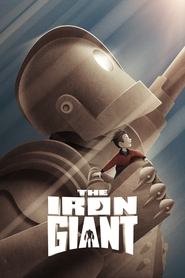God, the last fifteen minutes totally got me that I feel bad for making jokes earlier on. My overriding thought when the Giant was launching himself into the oncoming satellite was that, quite frankly, we don't deserve saving to begin with. You don't get that other stories where the giant beast helps a kid realise some truth (eg. the Gamera franchise, Free Willy, etc.) Why are people so mean?
Long before that, though, given that The Iron Giant is in part critique of the paranoid mindset of the US government, I was actually quite surprised by the film's suggestion that the kind of lefty/hippy/beatnik/anti-authoritarian embodied in the artist—cum—scrap merchant has an instinctive reaction not provide shelter to the Giant. Anyway, I'm not sure Hogarth's concept of a 'soul' would survive contact with an actual philosopher, and why a robot from outer space would naturally share the post-1793 "you are what you want to be" conception of self-determinism... But, man, those last fifteen minutes.
The Iron Giant isn’t a Cold War allegory so much as an Americana fairy tale; […] the movie swallows the myth of the era’s Wheaties-style sincerity with a grinning gulp. [T]he script and delicate art direction are less concerned with the ’50s as they were than in how the ’50s saw themselves—as evinced by comics, magazine ads, television shows—and how that benign self-image has trickled down through the decades into shorthand for conformity despite the ghostly mushroom clouds of alarm behind the cheerful façade.[…]
[The robot] is, like Melville’s Bartleby, an existential threat more than a physical one, and his relentlessly alien nature—Bartleby can’t help but deny requests, the giant can’t help but defend himself—makes him a target for [b]anishment.
— Joseph Jon Lanthier (Slant Magazine)
It is, one could say, blinded by the hindsight. How stupid the '50s seem from our enlightened age, yet how utterly easy and cheap it is to affect superiority to that decade, particularly when nowhere in the piece does it acknowledge the existence of an evil empire busily nurturing spies and building H-bombs and threatening to bury us after burying millions of its own.
— Stephen Hunter (The Washington Post)
For those who did see it [at the time], The Iron Giant felt very much of the moment. It's a movie that thoughtfully considered the senselessness of gun violence, released less than four months after Columbine. And the film's Sputnik-era setting and all of the march-of-progress anxiety that came with it were an avoidable reminder of the fears surrounding Y2K.
— Brian Raftery (Best Movie Year Ever: How 1999 Blew Up the Big Screen)

